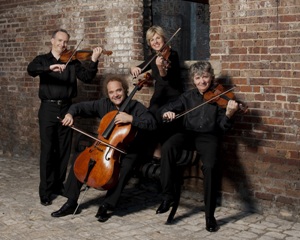Ludwig van Beethoven - Grosse Fuge Op.133
Ludwig van Beethoven - Grosse Fuge Op.133

Grosse Fuge in B flat, Op.133:
Overtura (Allegro) - Meno mosso e moderato - Allegro - Fuga
Takacs Quartet:
* Gabor Takács-Nagy, first violin
* Gabor Ormai, viola
* Roger Tapping, viola
* András Fejér, cello
The Große Fuge (or Grosse Fuge, also known in English as Grand Fugue), op. 133, is a single-movement composition for string quartet by Ludwig van Beethoven. A massive double fugue, it originally served as the final movement of Beethoven's Quartet No. 13 in B flat major (op. 130) but was replaced by a new finale and published in 1827 by itself as opus 133. It was composed in 1825, when the composer was completely deaf, and is considered one of Beethoven's late quartets. It was first performed in 1826, as the finale of the B flat quartet, by the Schuppanzigh Quartet.
The Grosse Fuge is famous for its extreme technical demands and its unrelentingly introspective nature, even by the standards of his late period. It is the largest and most difficult of all of Beethoven's string quartet movements. Most 19th century critics dismissed the work. Daniel Gregory Mason called it "repellent", a reviewer writing for Allgemeine musikalische Zeitung in 1826 described the fugue as "incomprehensible, like Chinese" and "a confusion of Babel". However critical opinion of the work has risen steadily since the beginning of the 20th century. The work is now considered among Beethoven's greatest achievements. Igor Stravinsky said of it, "[it is] an absolutely contemporary piece of music that will be contemporary forever."
Beethoven originally composed the Große Fuge as the final movement of his String Quartet No. 13 (op. 130). When the work was first performed the audience demanded encores of only two of the middle movements of the quartet. Beethoven, enraged, was reported to have growled, "And why didn't they encore the Fugue? That alone should have been repeated! Cattle! Asses!" However, the fugue was so demanding of contemporary performers and unpopular with audiences that Beethoven's publisher, Matthias Artaria, urged him to write a new finale for the string quartet. Beethoven, although notorious for his stubborn personality and indifference to public opinion or taste, acquiesced to his publisher's request on this occasion. He composed a replacement finale in late 1826. In May, 1827, about two months after Beethoven's death, Artaria published the first edition of opus 130 with the new finale, and Große Fuge as opus 133, as well as an four-hand piano arrangement, opus 134.
download: uploaded anonfiles gett mega 4shared mixturecloud yandex mediafire ziddu
Zmieniony (Piątek, 23 Sierpień 2013 11:54)








